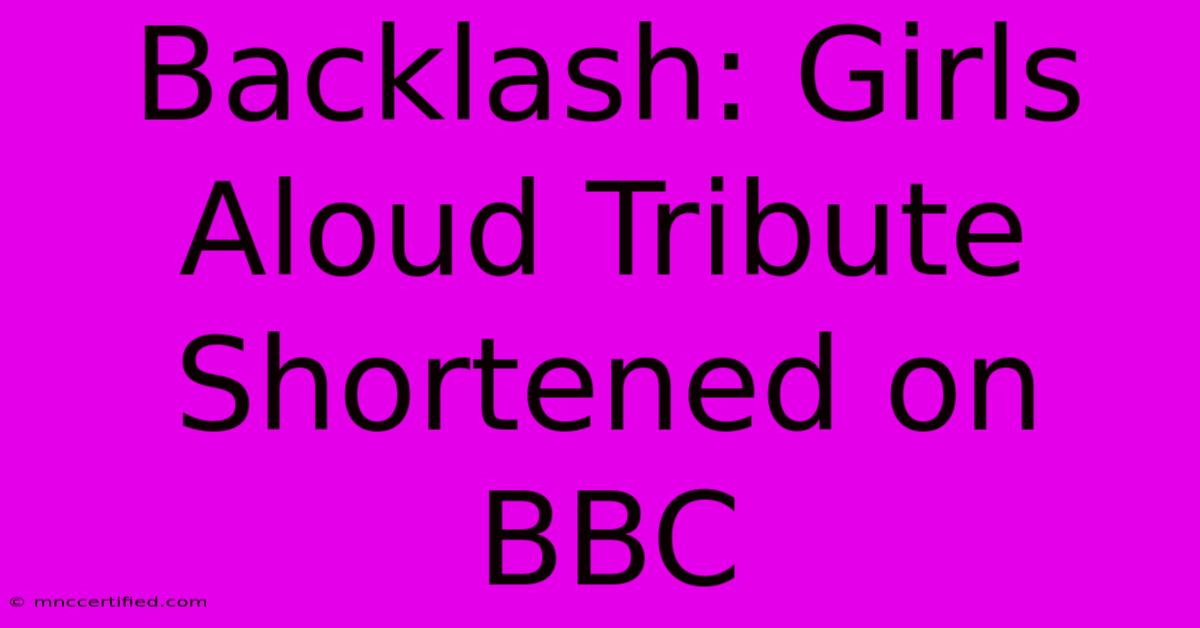Backlash: Girls Aloud Tribute Shortened On BBC

Table of Contents
Backlash: Girls Aloud Tribute Shortened on BBC – Fans React to Truncated Documentary
The BBC's recent airing of a Girls Aloud documentary, intended as a tribute to the iconic pop group, has sparked significant backlash from fans. The shortened runtime, significantly less than initially advertised, has left viewers feeling cheated and robbed of a proper celebration of the band's legacy. This article delves into the controversy surrounding the documentary's length and explores the passionate reactions from devoted Girls Aloud fans.
The Controversy: A Cut-Short Celebration
The documentary, promising an in-depth look at the group's career and impact, was heavily promoted in the weeks leading up to its broadcast. However, the actual runtime fell far short of expectations, leading to widespread disappointment and anger amongst fans who felt the documentary failed to do justice to the band's significant contributions to pop culture. Many took to social media to express their frustration, using hashtags like #GirlsAloud, #BBC, and #ShortenedDocumentary to voice their concerns. The perceived lack of sufficient coverage of individual members' journeys and the group's overall achievements fueled this online outrage.
Why the Shortened Runtime Matters
The backlash isn't simply about a shorter-than-expected program; it's about the perceived disrespect shown towards the legacy of Girls Aloud. The group achieved significant commercial success and cultural influence, selling millions of records and leaving an indelible mark on British pop music. A truncated documentary feels like a disservice to their immense talent and dedication. Fans invested their time and emotions into watching the documentary, only to be left feeling unsatisfied and let down. This breach of expectation has fueled the widespread criticism.
Fan Reactions: Outrage and Disappointment
The online response has been overwhelmingly negative. Many fans felt betrayed by the BBC's handling of the documentary, expressing their disappointment through various social media platforms. Numerous comments highlighted the feeling of a rushed and incomplete narrative, with key moments and details seemingly glossed over. The backlash isn't solely focused on the runtime; the editing choices and perceived lack of depth have also come under fire.
Calls for Accountability and a Full Version
The significant backlash has prompted calls for the BBC to address the concerns raised by fans. Many are demanding a full, uncut version of the documentary to be released, believing that the current version is an inadequate tribute to the band's impact. The conversation has extended beyond simple complaints, with discussions about the BBC's responsibility in delivering accurate and respectful content to its viewers. The situation highlights a crucial aspect of audience engagement and the importance of meeting expectations in documentary filmmaking.
The Future of Girls Aloud Documentaries
The controversy surrounding the shortened Girls Aloud documentary raises questions about future productions of this nature. Will production companies and broadcasters be more transparent about runtimes to avoid similar situations? Will fans continue to demand higher standards of quality and respect from these productions? The significant backlash could influence how documentaries about popular music groups are planned and executed in the future, pushing for greater accuracy and comprehensive storytelling.
Learning from the Backlash: Lessons for Broadcasters
This event serves as a significant lesson for broadcasters regarding audience management and expectations. Clear communication, accurate advertising, and respectful handling of sensitive subjects are paramount. Ignoring or dismissing fan concerns could lead to further criticism and damage the broadcaster's reputation. Transparency and accountability are key to avoiding future incidents of this nature.
The backlash against the shortened Girls Aloud documentary underscores the importance of respecting the legacy of beloved musical acts and the passionate connection fans have with their idols. The conversation highlights the need for honest and thorough storytelling in documentaries and the responsibility of broadcasters to deliver on their promises. Only time will tell if the BBC will respond to the widespread calls for a more complete tribute.

Thank you for visiting our website wich cover about Backlash: Girls Aloud Tribute Shortened On BBC. We hope the information provided has been useful to you. Feel free to contact us if you have any questions or need further assistance. See you next time and dont miss to bookmark.
Featured Posts
-
Watch Scotland Croatia Game Free
Nov 16, 2024
-
Business Insurance Top 100 Brokers
Nov 16, 2024
-
Sarahs Edition Girls Aloud Aid Children
Nov 16, 2024
-
Off Screen Lenny Rushs Family Life
Nov 16, 2024
-
Can I Cancel A Car Insurance Claim
Nov 16, 2024